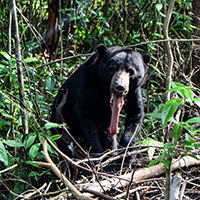It is hard to believe that on a glorious hot day in May 2018, in amongst a quiet forest, the almost soundless patter of bear paws on leaves actually represented the culmination of months of hard work. From their arrival at the Orangutan Care Center and Quarantine (OCCQ) in Central Kalimantan (Indonesian Borneo) on Christmas… Continue reading The four Bears from Pontianak: Bears of May 2020
Month: May 2020
Orangutan of the month May 2020
POPPY, Strong and Independent
There are three identified species of orangutan – the Sumatran, Tapanuli and Bornean. Bornean orangutans (Pongo pygmaeus) are the third heaviest living primate after two gorilla species. Studies have indicated that there are three subspecies on Borneo. The orangutans of Southwest Borneo (Pongo pygmaeus wurmbii) are the largest and most populous of the three Bornean… Continue reading Orangutan of the month May 2020
POPPY, Strong and Independent


